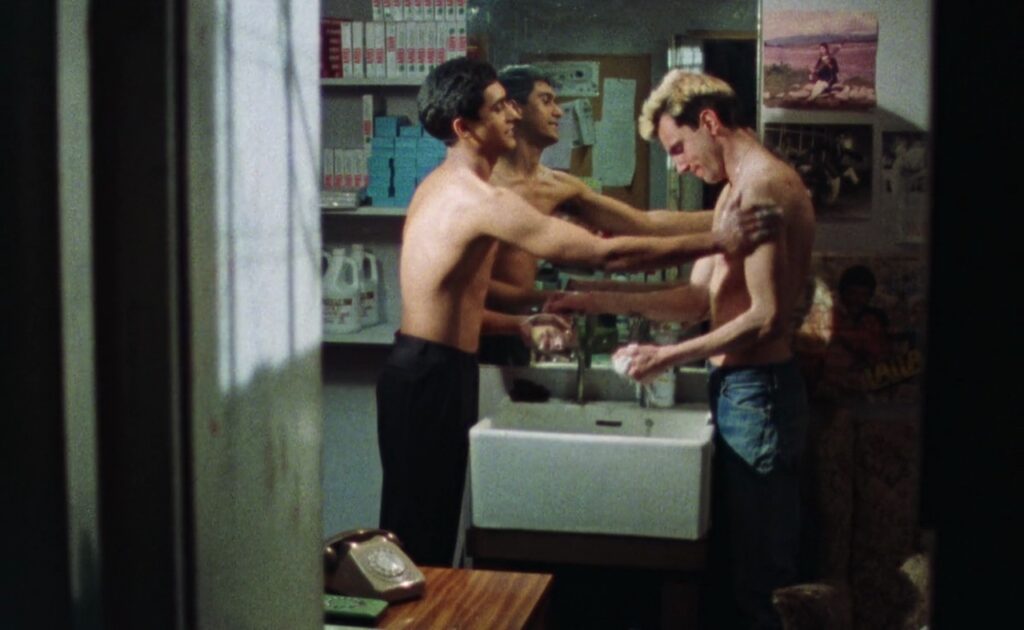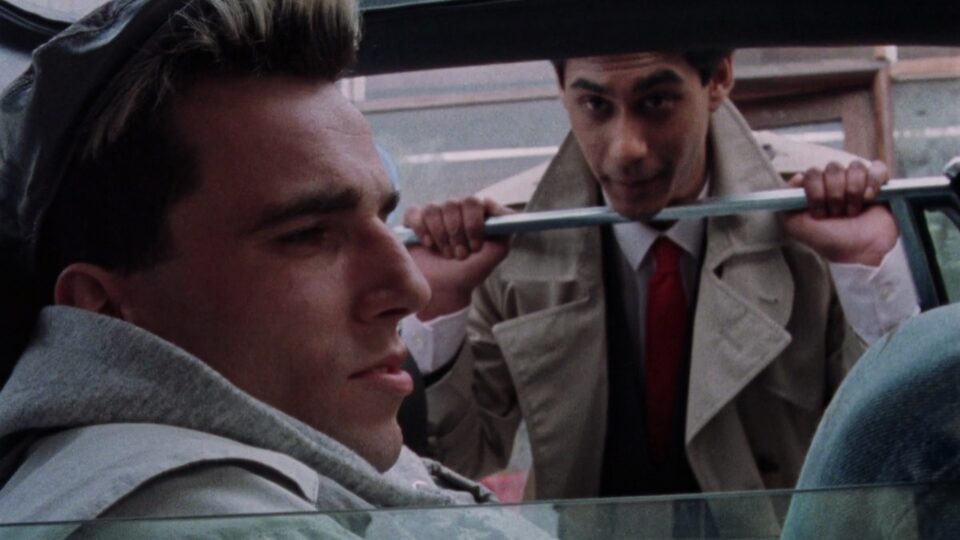This piece was written by Will Palmer, one of the Cinema Rediscovered 2025 Roaming Reporters – a talent development scheme in partnership with BFI Film Academy South West.
In 1984, ticket sales from UK cinemas had hit a record low. Despite international acclaim for British cinema, with Chariots of Fire and Gandhi both winning the best picture Oscar in 1981 and 1983, domestic audiences seemed to have lost interest.
The growing prominence of home television sets and the VCR meant that audiences had alternatives to going to the cinema. At a time when Thatcher’s recession had seen unemployment almost double from 6.8% to 11.4% by 1985, the signs were concerning.
The British pictures that were winning international prestige could be called many things – elegant, languid, classical – but certainly not ‘new’ or even particularly ‘exciting’. Domestic film production risked becoming a parody of itself. Thankfully, the government emerged with a new broadcasting network, ‘Channel 4’, and its subsidiary ‘Film 4 Productions’, which would, naturally, produce new films for the broadcaster.

Channel 4’s mandate explicitly championed risk and innovation, and the executives did just that. Largely eschewing the historical epics and period dramas Britain was known for, they took opportunities on films with controversial subject matters, soliciting scripts from writers unestablished in film or TV.
Enter Hanif Kureishi, who had attracted attention through his work at the Royal Court theatre in London. Channel 4 was in a position where they could take a chance on his next work: My Beautiful Laundrette.
Speaking with Mark Cosgrove (one of the co-founders of the Cinema Rediscovered festival, which, in its most recent edition, chose My Beautiful Laundrette to headline its 1980’s British cinema strand), he emphasised the importance of Jeremy Isaacs (chief executive of Channel 4 1982-1987), saying that he ‘was very much empowering of the commissioners’, avoiding the pitfalls of an overly bureaucratic and hierarchical management system.
Moreover, the strong regional theatre network in the UK at the time allowed them to find ‘new voices, new representation’ from a pool of talent who had been able to hone their craft outside of screenwriting traditions. Channel 4’s mandate and smart direction allowed them to source talent that mainstream studios were too afraid to touch (see also, Andrea Dunbar’s Rita, Sue, and Bob Too coming out two years later), and with that push formal and social boundaries for what could be shown on screen.

My Beautiful Laundrette follows Omar, a second-generation Pakistani migrant, whose father, having once been a lauded journalist, has lapsed into alcoholism and despair at the state of modern Britain. Omar’s Uncle Nasser gives him the chance to manage a rundown laundrette, during which time he runs into his childhood friend Johnny, who has grown into a right-wing extremist. Despite this, Omar offers Johnny a job at his laundrette, Johnny accepts, and their working relationship blossoms into a romantic one, albeit one they must struggle to keep hidden from both Omar’s family and Johnny’s former gang.
A major question in the film, one that was relevant for its characters, the viewers at the time, and the burgeoning Channel 4 itself, is ‘What opportunities lie in Britain?’. For those who’ve achieved success, like Nasser, ‘you can get anything you want. It’s all spread out and available…only you need to know how to squeeze the tits of the system’.
He embodies the Thatcherite dream of individualistic, free-market enterprise; the idea that guile and hard work can make you rich.
However, Kureishi highlights the extremities of this belief system through Nasser’s son, Salim. He initially seems like everything Omar wishes he could be: rich, well-dressed, and respected. But, once it transpires that he’s a drug dealer (after he enlists Omar as a trafficker), he begins trying to blackmail and extort Omar, beating him up and threatening him. He’s only out for himself and ruthless in the pursuit of maintaining money and status. He embodies the entrepreneurial spirit encouraged at the time, taken to its logical endpoint. He acts out the violence latent in Nasser’s idea of ‘squeezing the tits of the system’.
On the other hand, you have Johnny, who, when asked by Nasser’s daughter Tania why he sticks around the laundrette, simply replies – ‘No good jobs like this around’. Whilst Nasser’s rhetoric and conviction are vivid and memorable (and it effectively frames Omar’s rise and the narrative shape of the film), the character of Johnny better shows the banality and hopelessness of what people were living through at the time.

Another major idea explored in the film is: What defines us? Is it our national identity? Our economic one? Does our identity lie in our race, our class, or the clothes we wear? Kureishi exposes just how deeply these questions are embedded in our social lives, right down to one exchange where Johnny tells his former gang, ‘Palace ain’t my team. Millwall me’. Even the particular south London football team you support is important for determining who you’re for and who you’re against. Perhaps the film’s most impressive achievement is how, in 90 minutes, it captures the exhausting way that every decision we make affects how people perceive us, and how so much of what we want in life (respect, success, love) revolves around minute decisions concerning how we present ourselves.
These questions of opportunity, freedom and who we really are become resolved by the film’s intimate relationships. The anxiety of identity dissipates in moments of togetherness. These moments are difficult to define, but obvious when seen. If so much of the anxiety around who we are comes from how we present ourselves to others and how they interpret us, then these moments of intimacy become liberating because they’re the point when others stop asking questions and just accept what’s in front of them.
The film’s most joyful scene, before the grand re-opening of the laundrette, sees Omar and Johnny having sex in the back office, whilst Nasser and his mistress Rachel share a dance in the laundry room out front (both parties mercifully unaware of each other). In this moment, these couples are free from suspicious eyes, and don’t have to keep up appearances. They’re free to be who they really are. In these moments, what we might represent through our race, class, or sexuality becomes less important than what we are to someone we belong with.
